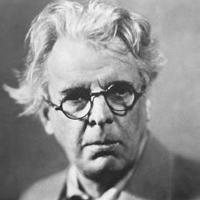A Prayer for My Daughter by William Butler Yeats: Summary
A Prayer for My Daughter by William Butler Yeats opens with an image of the newborn child sleeping in a cradle. A storm is raging with great fury outside his residence. A great gloom is on Yeats’ mind and is consumed with anxiety as to how to protect his child from the tide of hard times ahead. The poet keeps walking and praying for the young child and as he does so he is in a state of reverie. He feels a kind of gloom and worry about the future of his daughter.

William B. Yeats (1865-1939)
He says “As I walk and pray for my younger daughter, I imagine in a state of excitement and reverie” that the future years (years of violence and bloodshed and frenzy) have already come and that they seem to come dancing to the accompaniment of a drum which is beating frantically. These future years are seen by Yeats’ imagination as emerging out of the murderous (treacherous) innocence of the sea. In other words, the sea seems to be innocent but is capable of giving birth to those howling storms which are capable of leveling everything.
Yeats wants his daughter to possess some qualities so that she can face the future years independently and with confidence. Yeats says: Let her be given beauty, but a more important thing is that her beauty should not be of a kind which may either make her proud of her beauty or distract a stranger’s mind and eyes. Those whose beauty is capable of making them proud consider beauty an end in itself. The result is that pride leads to their losing natural kindness in some cases of that heart, revealing intimacy which helps them to make the right choice in life. Being able to make the right choices in life is a very important thing, but those who have excessive beauty are unable to do so and never find a good friend in the true sense of the world. The great thing about the poem is that it has a specific as well as general applicability. At the same time the poem makes an indirect reference to Maud Gonne also whom Yeats loved so much and yet could not win her hand.
The poet looks within himself and finds that there is hatred inside. He thinks that hatred kills innocence and wishes that his daughter should not harbor hatred. It was because of this unwholesome bent of the mind that Maud Gonne married a fool. The poet wished that her daughter should not cultivate a frantic intellect; he thinks that her daughter can remain innocent if she is free from hatred and intellectual fanaticism. The innocence is self-delighting, self-appeasing and self-affrighting. The poet’s last wish is that his daughter should marry a person of aristocratic family who may take her to a home where tradition and ceremony fill the atmosphere.
In the end, the poem is a prayer for order and grace in a battered civilization. Behind the prayer, of course, are Yeats’ bitter memories of Maud Gonne who had come to stand for the tragedy of how beauty and grace can be distorted by politics, intellectual hatred and arrogance.
Cite this Page!
Sharma, K.N. "A Prayer for My Daughter by William Butler Yeats: Summary." BachelorandMaster, 23 Nov. 2013, bachelorandmaster.com/britishandamericanpoetry/prayer-for-my-daughter.html.
Related Topics
A Prayer for My Daughter: Introduction
A Prayer for My Daughter: Analysis
The Scholars: Critical Analysis
Sailing to Byzantium: Analysis
The Theme of Immortality in Byzantium Poems
Among School Children: Analysis
Crazy Jane Talks with the Bishop
The Lamentation of the Old Pensioner
He Wishes for the Clothes of Heaven
An Irish Airman Foresees his Death
When You Are Old: Summary and Analysis
William Butler Yeats as a Symbolist
Truth of Human Life in Yeats's Poetry
Yeats and the Romantic Tradition
The Salient Features of Yeats's Poetry
Biography of William Butler Yeats
 |
bachelorandmaster.com |